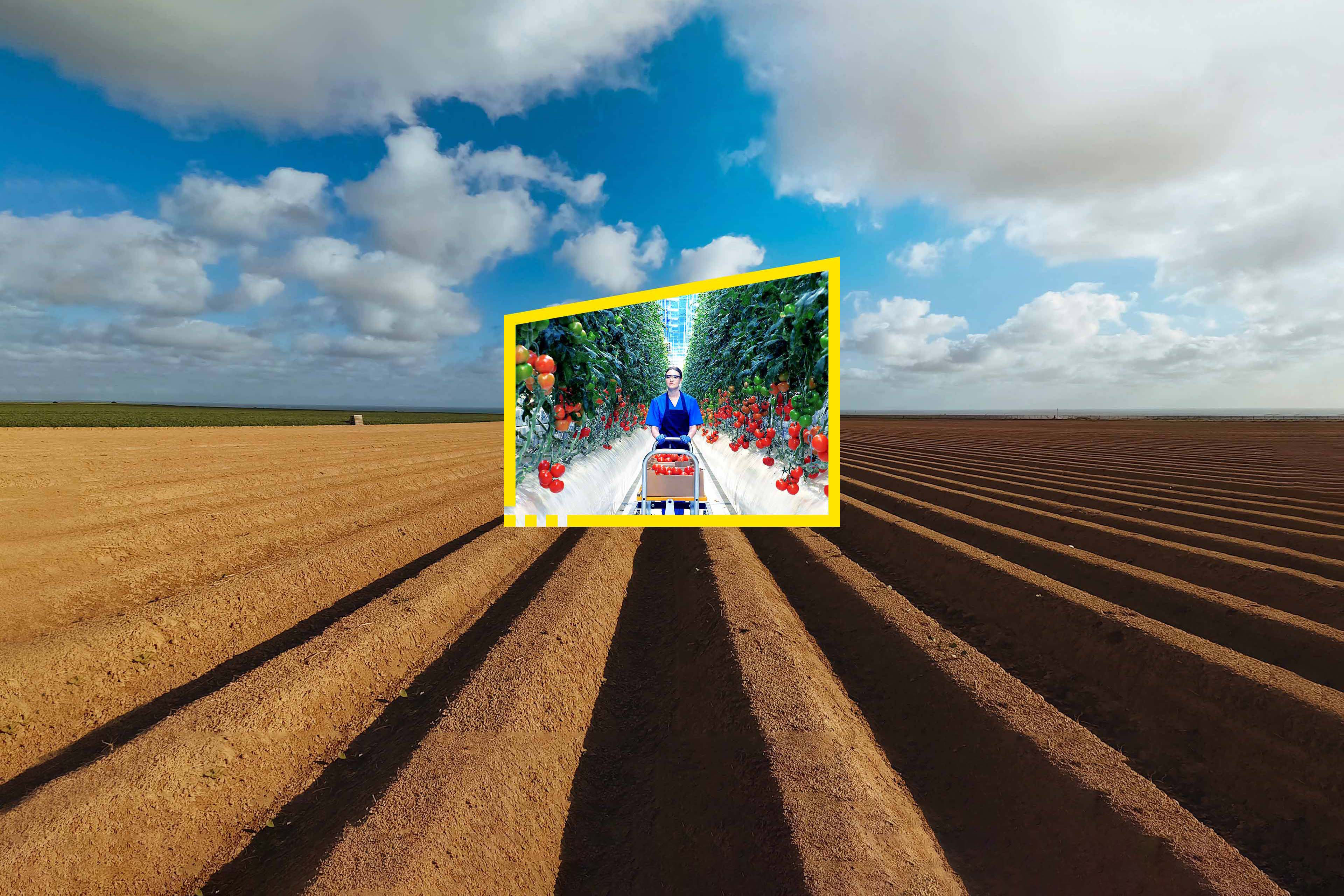EY refers to the global organization, and may refer to one or more, of the member firms of Ernst & Young Global Limited, each of which is a separate legal entity. Ernst & Young Global Limited, a UK company limited by guarantee, does not provide services to clients.

You can bite into Evrosad’s apples throughout the world
FFrom a difficult inception in 1995 and having undergone three significant challenges, the Evrosad group has come to own more than 500 hectares of land. Their annual output of around 20,000 tonnes of fruit and vegetables represents roughly a third of Slovenia’s entire production. They chiefly export apples to large retail chains and specialized fruit wholesalers in 18 countries, 13 of which are in the EU and six in the Middle East. The story of Evrosad from Krško began with Ivan Kozole and is today continued by his son, Boštjan Kozole, who sees only challenges rather than obstacles in his path.
Our goal is not to become the largest company in the Slovenian agricultural sector but we want to be the best.
Our goal is not to become the largest company in the Slovenian agricultural sector but we want to be the best.


The Kozole family founded Evrosad in 1995, when they bought 270 hectares of orchards with all the associated equipment, machinery and inventory from Mercator Agrokombinat. Shortly afterwards, Ivan and his partner were joined by Ivan’s son Boštjan, who is now in the process of taking over the company. The company’s early days were not easy, after taking over mechanization and cold storage which had not been renovated for seven years and were sorely in need of repair. “Only my father’s courage and his belief in the fruit industry paved our entrepreneurial path out of the system,” comments Boštjan.
Boštjan first imagined his future was in the law, before finding his passion in handball and sports management. In 1995 he was working as a semi-professional director of the Krško Handball Association. “Who knows where life would have led me if father hadn’t founded Evrosad when he did,” says Boštjan. His experience with sports management left an important mark, as he discovered the motivation that comes from working with a success-driven team. His first role in Evrosad was to cover legal matters and manage all the processes involved in denationalization. “The Slovenian Denationalization Act from 1992 was very awkward; properties were supposed to be returned in kind. This had a large impact on our industry, since we own a lot of land. Completion of these processes took around 10 years and some issues still remain open,” explains Boštjan. In 1998 and 1999, circumstances led him to take over exports when one of the workers had to go on medical leave. “When he retired, I took over sales,” adds Boštjan. Then his father Ivan let him know that he expected him to get a diploma. The thesis Boštjan defended at the Gea College focused on the restructuring of Evrosad and was very much practice based.


Agricultural work, such as producing fruit and vegetables, can lead to sleepless nights. Constant change, outside influences and anxiety over whether there will be anything to harvest cause many people to throw in the towel. For others, this is the motivation they need to adapt and find better solutions and Boštjan says that Evrosad was forged in the fire of three important challenges. The first came in 2004, when Slovenia entered the EU. “At that time, I was finishing my degree and taking over the management of the company. Father was still actively involved, but he took a step back and was focusing on his area of expertise as an agronomist. This solved many problems, since each of us did his own work. There were still some disagreements, but it never got so bad that we could not continue working together the next day,” explains Boštjan. When Slovenia joined the EU, Evrosad lost its main markets, Croatia and Bosnia and Hertzegovina, where they had exported half of their products. In searching for new markets, they decided to tackle the most difficult, which was the UK. “We had to adapt our selection, raise our quality and standards, and change our strategy and philosophy,” says Boštjan. “With this first milestone we set a good foundation and put Evrosad on the international map of fruit and vegetable producers.”
After 2004 they also began exporting to Romania, Russia and the Baltic countries. Apple sales to Dubai, one of their most important customers today, followed in 2010 and two years later they secured entry to the Egyptian market. Their second major challenge came in 2014, when Russia placed an embargo on European imports. “The Russian embargo caused great damage to our sector,” emphasizes Boštjan. Evrosad responded with a period of great diversification, during which the Ormož company transitioned to organic production. “We increased the production of pears and peaches, started growing cherries, strawberries, plums and last year also expanded to vegetables, which are becoming an increasingly important segment,” explains Boštjan. At first, they sent their apples to processing, but now they make their own juice. “For the third year in a row, only Evrosad is importing kiwis from New Zealand. Recently we also opened a market and started distributing fruit and vegetables at the highest level,” he says proudly. They also sell Granny Smith apples, which sell very poorly in Slovenia, to the Maldives, where they are offered to wealthy guests. “I said to myself: If the French and the Italians export, why shouldn’t we?” adds Boštjan, revealing his ambition.

“During its diversification period, Evrosad also focused on protection against climatic challenges.

“During its diversification period, Evrosad also focused on protection against climatic challenges.
The third challenge and milestone for this family company was meteorological. The 2016 frost destroyed 75% of their crops and the following year’s similar conditions took 95%. In 2018 the harvest was too successful and consumption reduced, so prices fell. In the last two years they have again faced frost, but this year with the added complication of the coronavirus. However, during its diversification period, Evrosad also focused on protection against climatic challenges. “We invested in anti-hail netting, irrigation systems, a misting system to prevent frost damage and a sorting center. We also expanded our cold storage by a factor of three,” explains Boštjan.
By conquering the UK market, Evrosad put itself on the map of the most important fruit and vegetable producers.
“Our goal is not to become the largest company in our sector but we want to be the best,” says Boštjan. Their distribution chain is very short, which means that final consumers can bite into an Evrosad apple only a few hours after it was picked. As the biggest fruit and vegetable grower in Slovenia, they see themselves as part of the industrial sector: “Agriculture is all too often put into a separate category. It’s true that this industry is unique in many ways, but we are still talking about products with certain associated costs, competition and market specifics.”
Today, the Evrosad group unites three companies, the parent company in Krško, Sadjarstvo Blanca and Sadjarstvo Ormož, and has 30 contractual partners, 23 of which grow fruit and seven produce vegetables. They also collaborate with the universities of Ljubljana and Maribor. An advantage of their collaboration with local producers is higher quality products. After five years of organic farming, various analyses, on which the company spends several thousand euros per year, show that their fruit and vegetables are healthy and of high quality. “Our strawberries may only survive four or five days in the fridge, and not two or more weeks like the Italian and Spanish ones, but that doesn’t matter, as ours are so delicious that you will eat them in less than an hour. It’s the same things with peaches; the Italian ones are beautiful, big, have a wonderful color and no taste. The scent of our old heirloom varieties is obvious from feet away,” points out Boštjan.

“As a tribute to his father, in line with the company’s philosophy, Boštjan has created a new range of brandy made from William pears, called Zima.

“As a tribute to his father, in line with the company’s philosophy, Boštjan has created a new range of brandy made from William pears, called Zima.
Ivan Kozole, the founder, is retiring from the company at the age of 78. “I have formally taken over the management of the company, but father is still an authorized representative,” explains Boštjan. As a tribute to his father, in line with the company’s philosophy, Boštjan has created a new range of brandy made from William pears, which are still grown in the family hometown in the fruit growing region of Marof. The brand is called Zima, which means winter. “The bottles were designed by my nephew Emil Kozole, with a label telling the story of my father as a young man, when he worked for a fruit grower during the year and distilled a special drink during the winter,” says Boštjan, explaining this gesture of respect. The company is also starting a campaign to promote local Slovenian fruit, aligned with existing campaigns for local milk and meat. One aim of the campaign is to educate consumers about locally available seasonal fruit and vegetables, as the common belief that all fruit and vegetables should be available all year round is simply not sustainable.
The concept of local self-sufficiency became even more important during the coronavirus pandemic. Evrosad noticed that the demand for local fruit and vegetables increased dramatically. “People wanted to take care of their immune systems and health. The most in demand were apples, which is the only Slovenian-grown fruit available in March and April,” say Boštjan about this difficult period. Their new approach will allow them to grow the company and encourage Slovenians to reject imported produce in favor of locally grown, delicious, healthy and seasonal fruit and vegetables.
Ivan Kozole, owner
Company name: Evrosad d.o.o. Krško
Number of employees (2019): 125
Net sales revenue (2019): €10.1 million
Interviewees:
Boštjan Kozole, Director
Ivan Kozole, Owner
Summary
Evrosad in a nutshell: entrepreneurial spirit, local production, self-sufficiency, development, collaboration.



